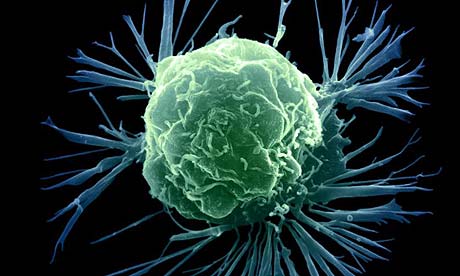Finishing Up 12.2
Two Important External Signals:
Two Important External Signals:
Density-dependent inhibition: phenomenon in which crowded cells top dividing
Most animal cells also exhibit anchorage dependence, in which they must be attached to a substratum in order to divide. (E.g. multicellular matrix of a tissue)
What About Cancer Cells?
The cell cycle controls do not apply to cancer cells. This means that cancer cells do not respond normal to the body's control mechanisms:
*They don't stop at the normal checkpoints
*If/when they stop dividing,they do so at abnormal points
Internally, cancer cells may not need growth factors to grow and divide:
*They may make their own growth factor
*They may convey a growth factor's signal without the presence of the growth factor
*They may have an abnormal cell cycle control system
Externally, these cells do not exhibit density-dependent inhibition or anchorage dependence: they just keep on dividing
 Here is a cool video showing T-cells attacking rapidly growing cancer cells:
Here is a cool video showing T-cells attacking rapidly growing cancer cells:
http://www.hybridmedicalanimation.com/anim_tumor.html
Start of Chapter 13
Meiosis and Sexual Life Cycles: an Intro to Heredity
Heredity is defined as the transmission from one generation to the next. This is also known as inheritance
Genetics is the study of heredity and variation. Variation is the genetic difference between siblings or members of the same species
Genes are DNA segments -- the basic units of heredity that are transmitted from one generation to the next. The location of a gene on the chromosome is called its locus (plural is loci)
So we are now on our way toward meiosis. Here is a website that animates both mitosis and meiosis: http://www.pbs.org/wgbh/nova/baby/divi_flash.html
On this website: http://nobelprize.org/educational_games/medicine/2001/index.html
is a game called Control the Cell Cycle.It is a good review of the cell cycle!!!!!
DON'T FORGET: CHAPTER 13 VOCAB IS DUE TOMORROW!!!!!!!!!
Multiple Choice:
1. Observations of cancer cells in culture support the hypothesis that cancer cells:
a. do not exhibit density-dependent inhibition
b. produce molecules that inhibit the growth factors required for cell division
c. exhibit anchorage dependence
d. all of the above
2. ______is a modified type of cell division in sexually reproducing organisms consisting of two rounds of cell division but only one round of DNA replication. It results in cells with half the number of chromosome sets as the original cell
a. synapsis
b. meiosis
c. syngamy
d.mitosis
3. ______is a cell containing two sets of chromosomes, one set inherited from each parent
a. somatic
b. epithelial
c. haploid
d. diploid
Answers: a, b, d
*They don't stop at the normal checkpoints
*If/when they stop dividing,they do so at abnormal points
Internally, cancer cells may not need growth factors to grow and divide:
*They may make their own growth factor
*They may convey a growth factor's signal without the presence of the growth factor
*They may have an abnormal cell cycle control system
Externally, these cells do not exhibit density-dependent inhibition or anchorage dependence: they just keep on dividing
 Here is a cool video showing T-cells attacking rapidly growing cancer cells:
Here is a cool video showing T-cells attacking rapidly growing cancer cells: http://www.hybridmedicalanimation.com/anim_tumor.html
Start of Chapter 13
Meiosis and Sexual Life Cycles: an Intro to Heredity
Heredity is defined as the transmission from one generation to the next. This is also known as inheritance
Genetics is the study of heredity and variation. Variation is the genetic difference between siblings or members of the same species
Genes are DNA segments -- the basic units of heredity that are transmitted from one generation to the next. The location of a gene on the chromosome is called its locus (plural is loci)
So we are now on our way toward meiosis. Here is a website that animates both mitosis and meiosis: http://www.pbs.org/wgbh/nova/baby/divi_flash.html
On this website: http://nobelprize.org/educational_games/medicine/2001/index.html
is a game called Control the Cell Cycle.It is a good review of the cell cycle!!!!!
DON'T FORGET: CHAPTER 13 VOCAB IS DUE TOMORROW!!!!!!!!!
Multiple Choice:
1. Observations of cancer cells in culture support the hypothesis that cancer cells:
a. do not exhibit density-dependent inhibition
b. produce molecules that inhibit the growth factors required for cell division
c. exhibit anchorage dependence
d. all of the above
2. ______is a modified type of cell division in sexually reproducing organisms consisting of two rounds of cell division but only one round of DNA replication. It results in cells with half the number of chromosome sets as the original cell
a. synapsis
b. meiosis
c. syngamy
d.mitosis
3. ______is a cell containing two sets of chromosomes, one set inherited from each parent
a. somatic
b. epithelial
c. haploid
d. diploid
Answers: a, b, d


No comments:
Post a Comment